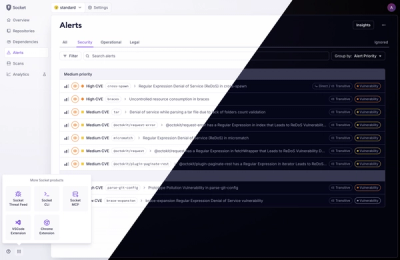
Product
A Fresh Look for the Socket Dashboard
We’ve redesigned the Socket dashboard with simpler navigation, less visual clutter, and a cleaner UI that highlights what really matters.
zod-validation-error
Advanced tools
Wrap zod validation errors in user-friendly readable messages
Wrap zod validation errors in user-friendly readable messages.
error.details;Note: This is the v4 version of zod-validation-error. If you are looking for the zod v3 support, please click here
npm install zod-validation-error
import { z as zod } from 'zod/v4';
import { fromError, createErrorMap } from 'zod-validation-error/v4';
// use custom error map to automatically format messages
// this is optional, but recommended
// without this, zod's native error messages will be used
zod.config({
customError: createErrorMap({
includePath: true,
}),
});
// create zod schema
const zodSchema = zod.object({
id: zod.int().positive(),
email: zod.email(),
});
// parse some invalid value
try {
zodSchema.parse({
id: 1,
email: 'coyote@acme', // note: invalid email
});
} catch (err) {
const validationError = fromError(err);
// the error is now readable by the user
// you may print it to console
console.log(validationError.toString());
// or return it as an actual error
return validationError;
}
For more fine-grained control over the error messages, you may pass the error map as an option to the fromError function.
import { z as zod } from 'zod/v4';
import { fromError, createErrorMap } from 'zod-validation-error/v4';
// create zod schema
const zodSchema = zod.object({
id: zod.int().positive(),
email: zod.email(),
});
// parse some invalid value
try {
zodSchema.parse({
id: 1,
email: 'coyote@acme', // note: invalid email
});
} catch (err) {
// create custom error map
// this is optional, but recommended
// without this, zod's native error messages will be used
// and the error will not be user-friendly
const errorMap = createErrorMap({
includePath: false,
});
const validationError = fromError(err, {
error: errorMap,
});
// the error is now readable by the user
// you may print it to console
console.log(validationError.toString());
// or return it as an actual error
return validationError;
}
Zod errors are difficult to consume for the end-user. This library wraps Zod validation errors in user-friendly readable messages that can be exposed to the outer world, while maintaining the original errors in an array for dev use.
[
{
"origin": "number",
"code": "too_small",
"minimum": 0,
"inclusive": false,
"path": ["id"],
"message": "Number must be greater than 0 at \"id\""
},
{
"origin": "string",
"code": "invalid_format",
"format": "email",
"pattern": "/^(?!\\.)(?!.*\\.\\.)([A-Za-z0-9_'+\\-\\.]*)[A-Za-z0-9_+-]@([A-Za-z0-9][A-Za-z0-9\\-]*\\.)+[A-Za-z]{2,}$/",
"path": ["email"],
"message": "Invalid email at \"email\""
}
]
Validation error: Number must be greater than 0 at "id"; Invalid email at "email"
Main ValidationError class, extending native JavaScript Error.
message - string; error message (required)options - ErrorOptions; error options as per JavaScript definition (optional)
options.cause - any; can be used to hold the original zod error (optional)messageimport { ValidationError } from 'zod-validation-error/v4';
const error = new ValidationError('foobar');
console.log(error instanceof Error); // prints true
message and options.causeimport { z as zod } from 'zod/v4';
import { ValidationError } from 'zod-validation-error/v4';
const error = new ValidationError('foobar', {
cause: new zod.ZodError([
{
origin: 'number',
code: 'too_small',
minimum: 0,
inclusive: false,
path: ['id'],
message: 'Number must be greater than 0 at "id"',
input: -1,
},
]),
});
console.log(error.details); // prints issues from zod error
Creates zod-validation-error's errorMap, which is used to format issues into user-friendly error messages.
Meant to be passed as an option to fromError, fromZodIssue, fromZodError, toValidationError or MessageBuilder.
Note: zod-validation-error's errorMap is an errorMap like all others and thus can also be used directly with zod (see https://zod.dev/error-customization for further details).
options - Object; formatting options (optional)
| Name | Type | Description |
|---|---|---|
includePath | boolean | Indicates whether to include the erroneous property key in the error message (optional, defaults to true) |
displayInvalidFormatDetails | boolean | Indicates whether to display invalid format details (e.g. regexp pattern) in the error message (optional, defaults to false) |
maxAllowedValuesToDisplay | number | Max number of allowed values to display (optional, defaults to 10) |
allowedValuesSeparator | string | Used to concatenate allowed values in the message (optional, defaults to ", ") |
allowedValuesLastSeparator | string | undefined | Used to concatenate last allowed value in the message (optional, defaults to " or "). Set to undefined to disable last separator. |
wrapAllowedValuesInQuote | boolean | Indicates whether to wrap allowed values in quotes (optional, defaults to true). Note that this only applies to string values. |
maxUnrecognizedKeysToDisplay | number | Max number of unrecognized keys to display in the error message (optional, defaults to 5) |
unrecognizedKeysSeparator | string | Used to concatenate unrecognized keys in the message (optional, defaults to ", ") |
unrecognizedKeysLastSeparator | string | undefined | Used to concatenate the last unrecognized key in message (optional, defaults to " and "). Set to undefined to disable last separator. |
wrapUnrecognizedKeysInQuote | boolean | Indicates whether to wrap unrecognized keys in quotes (optional, defaults to true). Note that this only applies to string keys. |
issuesInTitleCase | boolean | Indicates whether to convert issues to title case (optional, defaults to true). |
unionSeparator | string | Used to concatenate union-issues in user-friendly message (optional, defaults to " or ") |
issueSeparator | string | Used to concatenate issues in user-friendly message (optional, defaults to ";") |
dateLocalization | boolean | Intl.LocalesArgument | Indicates whether to localize date values in the error message (optional, defaults to true). If set to true, it will use the default locale of the environment. You can also pass an Intl.LocalesArgument to specify a custom locale. |
numberLocalization | boolean | Intl.LocalesArgument | Indicates whether to localize number values in the error message (optional, defaults to true). If set to true, it will use the default locale of the environment. You can also pass an Intl.LocalesArgument to specify a custom locale. |
import { createErrorMap } from 'zod-validation-error/v4';
const messageBuilder = createErrorMap({
includePath: false,
maxAllowedValuesToDisplay: 3,
});
Creates zod-validation-error's default MessageBuilder, which is used to produce user-friendly error messages.
Meant to be passed as an option to fromError, fromZodIssue, fromZodError or toValidationError.
options - Object; formatting options (optional)
| Name | Type | Description |
|---|---|---|
maxIssuesInMessage | number | Max issues to include in user-friendly message (optional, defaults to 99) |
issueSeparator | string | Used to concatenate issues in user-friendly message (optional, defaults to ";") |
prefix | string | undefined | Prefix to use in user-friendly message (optional, defaults to "Validation error"). Pass undefined to disable prefix completely. |
prefixSeparator | string | Used to concatenate prefix with rest of the user-friendly message (optional, defaults to ": "). Not used when prefix is undefined. |
error | ErrorMap | Accepts an errorMap to format individual issues into user-friendly error messages (optional, defaults to undefined). Note that this is an optional property and if not provided, the default error map will be used. Also, you don't need to pass zod-validation-error's errorMap here; you can use your own custom errorMap if you want. |
import { createErrorMap, createMessageBuilder } from 'zod-validation-error/v4';
const messageBuilder = createMessageBuilder({
maxIssuesInMessage: 3,
error: createErrorMap({
includePath: false,
}),
});
A type guard utility function, based on instanceof comparison.
error - error instance (required)import { z as zod } from 'zod/v4';
import { ValidationError, isValidationError } from 'zod-validation-error/v4';
const err = new ValidationError('foobar');
isValidationError(err); // returns true
const invalidErr = new Error('foobar');
isValidationError(err); // returns false
A type guard utility function, based on heuristics comparison.
Why do we need heuristics since we can use a simple instanceof comparison? Because of multi-version inconsistencies. For instance, it's possible that a dependency is using an older zod-validation-error version internally. In such case, the instanceof comparison will yield invalid results because module deduplication does not apply at npm/yarn level and the prototype is different.
tl;dr if you are uncertain then it is preferable to use isValidationErrorLike instead of isValidationError.
error - error instance (required)import {
ValidationError,
isValidationErrorLike,
} from 'zod-validation-error/v4';
const err = new ValidationError('foobar');
isValidationErrorLike(err); // returns true
const invalidErr = new Error('foobar');
isValidationErrorLike(err); // returns false
A type guard utility function, based on heuristics comparison.
Why do we need heuristics since we can use a simple instanceof comparison? Because of multi-version inconsistencies. For instance, it's possible that a dependency is using an older zod version internally. In such case, the instanceof comparison will yield invalid results because module deduplication does not apply at npm/yarn level and the prototype is different.
error - error instance (required)import { z as zod } from 'zod/v4';
import { ValidationError, isZodErrorLike } from 'zod-validation-error/v4';
const zodValidationErr = new ValidationError('foobar');
isZodErrorLike(zodValidationErr); // returns false
const genericErr = new Error('foobar');
isZodErrorLike(genericErr); // returns false
const zodErr = new zod.ZodError([
{
origin: 'number',
code: 'too_small',
minimum: 0,
inclusive: false,
path: ['id'],
message: 'Number must be greater than 0 at "id"',
input: -1,
},
]);
isZodErrorLike(zodErr); // returns true
Converts an error to ValidationError.
What is the difference between fromError and fromZodError? The fromError function is a less strict version of fromZodError. It can accept an unknown error and attempt to convert it to a ValidationError.
error - unknown; an error (required)options - Object; formatting options (optional)
messageBuilder - MessageBuilder; a function that accepts an array of zod.ZodIssue objects and returns a user-friendly error message in the form of a string (optional).Alternatively, you may pass createMessageBuilder options directly as options. These will be used as arguments to create the MessageBuilder instance internally.
Converts a single zod issue to ValidationError.
zodIssue - zod.ZodIssue; a ZodIssue instance (required)options - Object; formatting options (optional)
messageBuilder - MessageBuilder; a function that accepts an array of zod.ZodIssue objects and returns a user-friendly error message in the form of a string (optional).Alternatively, you may pass createMessageBuilder options directly as options. These will be used as arguments to create the MessageBuilder instance internally.
Converts zod error to ValidationError.
Why is the difference between ZodError and ZodIssue? A ZodError is a collection of 1 or more ZodIssue instances. It's what you get when you call zodSchema.parse().
zodError - zod.ZodError; a ZodError instance (required)options - Object; formatting options (optional)
messageBuilder - MessageBuilder; a function that accepts an array of zod.ZodIssue objects and returns a user-friendly error message in the form of a string (optional).Alternatively, you may pass createMessageBuilder options directly as options. These will be used as arguments to create the MessageBuilder instance internally.
A curried version of fromZodError meant to be used for FP (Functional Programming). Note it first takes the options object if needed and returns a function that converts the zodError to a ValidationError object
toValidationError(options) => (zodError) => ValidationError
import * as Either from 'fp-ts/Either';
import { z as zod } from 'zod/v4';
import { toValidationError, ValidationError } from 'zod-validation-error/v4';
// create zod schema
const zodSchema = zod
.object({
id: zod.int().positive(),
email: zod.email(),
})
.brand<'User'>();
export type User = zod.infer<typeof zodSchema>;
export function parse(
value: zod.input<typeof zodSchema>
): Either.Either<ValidationError, User> {
return Either.tryCatch(() => schema.parse(value), toValidationError());
}
While both libraries aim to provide a human-readable string representation of a zod error, they differ in several ways...
Disclaimer: as per this comment, we have no intention to antagonize zod. In fact, we are happy to decommission this module assuming it's in the best interest of the community. As of now, it seems that there's room for both zod-validation-error and prettifyError, also based on Colin McDonnell's response.
Use the isValidationErrorLike type guard.
Scenario: Distinguish between ValidationError VS generic Error in order to respond with 400 VS 500 HTTP status code respectively.
import { isValidationErrorLike } from 'zod-validation-error/v4';
try {
func(); // throws Error - or - ValidationError
} catch (err) {
if (isValidationErrorLike(err)) {
return 400; // Bad Data (this is a client error)
}
return 500; // Server Error
}
ValidationError outside zodIt's possible to implement custom validation logic outside zod and throw a ValidationError.
import { ValidationError } from 'zod-validation-error/v4';
import { Buffer } from 'node:buffer';
function parseBuffer(buf: unknown): Buffer {
if (!Buffer.isBuffer(buf)) {
throw new ValidationError('Invalid argument; expected buffer');
}
return buf;
}
import { ValidationError } from 'zod-validation-error/v4';
try {
// do something that throws an error
} catch (err) {
throw new ValidationError('Something went deeply wrong', { cause: err });
}
ValidationError with custom "error map"Zod supports customizing error messages by providing a custom "error map". You may combine this with zod-validation-error to produce user-friendly messages.
errorMap propertyIf all you need is to produce user-friendly error messages you may use the errorMap property.
import { z as zod } from 'zod/v4';
import { fromError, createErrorMap } from 'zod-validation-error/v4';
zod.config({
customError: createErrorMap({
includePath: true,
}),
});
zod-validation-error support CommonJSYes, zod-validation-error supports CommonJS out-of-the-box. All you need to do is import it using require.
const { ValidationError } = require('zod-validation-error/v4');
Source code contributions are most welcome. Please open a PR, ensure the linter is satisfied and all tests pass.
Causaly is building the world's largest biomedical knowledge platform, using technologies such as TypeScript, React and Node.js. Find out more about our openings at https://jobs.ashbyhq.com/causaly.
MIT
3.5.2
FAQs
Wrap zod validation errors in user-friendly readable messages
The npm package zod-validation-error receives a total of 3,938,167 weekly downloads. As such, zod-validation-error popularity was classified as popular.
We found that zod-validation-error demonstrated a healthy version release cadence and project activity because the last version was released less than a year ago. It has 4 open source maintainers collaborating on the project.
Did you know?

Socket for GitHub automatically highlights issues in each pull request and monitors the health of all your open source dependencies. Discover the contents of your packages and block harmful activity before you install or update your dependencies.

Product
We’ve redesigned the Socket dashboard with simpler navigation, less visual clutter, and a cleaner UI that highlights what really matters.

Industry Insights
Terry O’Daniel, Head of Security at Amplitude, shares insights on building high-impact security teams, aligning with engineering, and why AI gives defenders a fighting chance.

Security News
MCP spec updated with structured tool output, stronger OAuth 2.1 security, resource indicators, and protocol cleanups for safer, more reliable AI workflows.